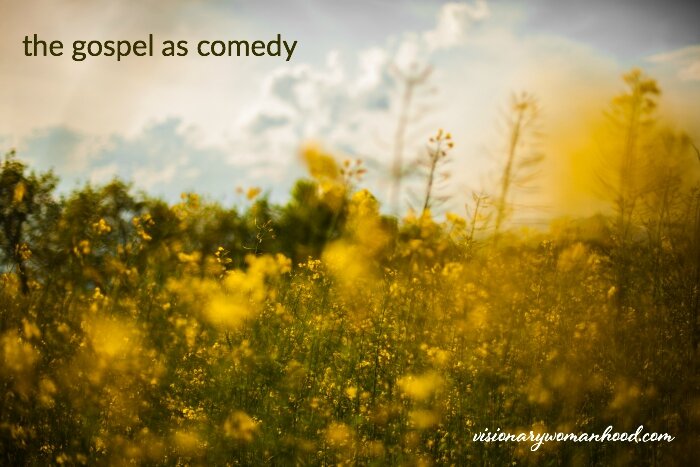
It’s been a month of marinating in Buechner’s Telling the Truth. Oh my. It’s delish. So I wrote a little bit about how Beuchner presents the gospel as tragedy HERE. But he makes an argument for the gospel as comedy as well.
Comedy is that genre in literature that takes a situation of (often) exaggerated impending doom and hopelessness and unexpectedly twists it into a story of salvation for all the characters. If tragedy is autumn with winter right around the corner, comedy is dead winter melting into hopeful, living spring.
Do you see how comedy isn’t even possible without tragedy? So goes the gospel. It is good news for the hopelessly lost. It’s comedy. Here’s how Beuchner puts it:
People are prepared for everything except for the fact that beyond the darkness of their blindness there is a great light. They are prepared to go on breaking their backs plowing the same old field until the cows come home without seeing, until they stub their toes on it, that there is a treasure buried in that field rich enough to buy Texas.
They are prepared for a God who strikes hard bargains but not for a God who gives as much for an hour’s work as for a day’s. They are prepared for a mustard-seed Kingdom of God no bigger than the eye of a newt but not for the great banyan it becomes with birds in its branches singing Mozart.
They are prepared for the potluck supper at First Presbyterian but not for the marriage supper of the Lamb, and when the bridegroom finally arrives at midnight with vine leaves in his hair, they turn up with their lamps to light him on his way all right only they have forgotten the oil to light them with and stand there with their big, bare, virginal feet glimmering faintly in the dark.
And finally, the Gospel itself is comedy—the coming together of Mutt and Jeff, the Captain and the Kids, the Wizard of Oz and the Scarecrow: the coming together of God in His unending greatness and glory and man in his unending littleness, prepared for the worst but rarely for the best, prepared for the possible but rarely for the impossible.
The good news breaks into a world where the news has been so bad for so long that when it is good nobody hears it much except for a few. And who are the few that hear it? They are the ones who labor and are heavy-laden. They are the last people you might expect to hear it, themselves the bad jokes and stooges and scarecrows of the world, the tax-collectors and whores and misfits. They are the poor people, the broken people, the ones who in terms of the world’s wisdom are children and madmen and fools. They have cut themselves shaving. Rich or poor, successes or failures as the world counts it, they are the ones who are willing to believe in miracles because they know it will take a miracle to fill the empty place inside them where grace and peace belong with grace and peace.
Old Sarah with her China teeth knows it will take a miracle to fill the empty place inside her where she waits for a baby that will never come, so when the angel appears and tells her a baby is coming she laughs and Abraham laughs with her because, having used up all their tears they have nothing but laughter left. Because although what the angel says may be too good to be true, who knows? Maybe the truth of it is that it’s too good not to be true.
You can get Telling the Truth HERE. There is so much to chew on. I love to grab my coffee and my pen in the morning when everything is still quiet and just read and soak and sip. It fills me right up with joy.










Please note: I reserve the right to delete comments that are offensive or off-topic.